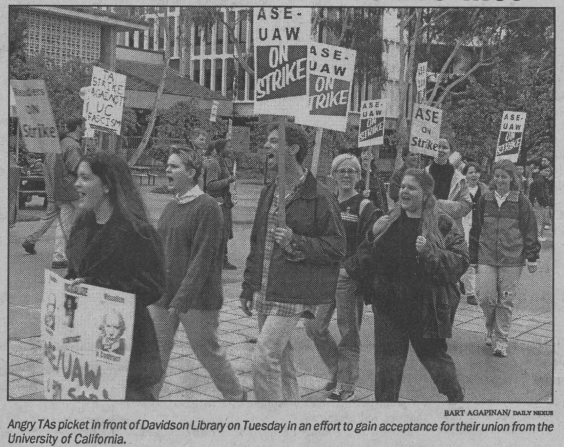On Dec. 2, 1998, when I was a Graduate Student Instructor at UC Berkeley, I walked away from my classroom and onto a picket line to strike for recognition of the Association of Graduate Student Employees union (ASGE/UAW). In the days leading up to the strike, University administrators argued that we were students, not workers; and that our paychecks were financial aid, not wages. Most concerning to me and many others, the University administrators told us repeatedly that unionization would damage the critical mentorship relationships with faculty that are so important to success in graduate school.
It took two more years of negotiations, legal petitions and labor actions before UAW Local 2865 gained hard-earned recognition, first representing all graduate student instructors — and now all academic student employees — across the University of California system. Unsurprisingly, the fears stoked by University of California administrators never materialized. For nearly a quarter century, UC graduate student employees have been represented through collective bargaining. Their work as unionized employees has not jeopardized their status as students. And graduate students continue to form productive mentoring and advising relationships with UC faculty.
Why didn’t unionization of graduate student workers at the UC system affect faculty-student advising relationships? The simple reason is that the issues that drive student workers to seek union representation — affordability, healthcare and housing costs — are issues that faculty have little or no control over. At Stanford, a recent survey conducted by the Graduate Student Council found that 78% of respondents reported that they could not meet minimum standards for covering rent, health care, food and transportation. Anecdotally, these statistics are made real to me when, in advising and mentoring meetings, students confide to me that they are deferring needed health care or relying on local food banks for their groceries. It is tragic that in the fourth richest county in the United States, and at Stanford University, with the fourth largest endowment of any United States college or university, many of our graduate students are struggling to meet basic human needs.
The situation is only getting worse: the recently-announced 2023-2024 cost-of-living adjustment for graduate student wages falls below inflation rates for the third year in a row. Affordability issues are affecting Stanford’s ability to attract, recruit and retain the most talented graduate students in our disciplines. And research shows that financial concerns have a direct impact on graduate student motivation and degree completion. Data from the UC system validates this: since graduate student workers gained union recognition, doctoral degree completion has steadily increased across the UC system. In other words, graduate student unionization appears to support, rather than detract from, graduate students’ academic progress.
In the weeks and months ahead, Stanford administrators may trot out the same familiar anti-union rhetoric that UC Berkeley administrators used in the 1990s. If they do, don’t believe the hype. Collective bargaining doesn’t disrupt advising relationships between graduate students and faculty. Instead, it enhances our academic community by ensuring that graduate workers have the dignity of union representation when they negotiate with the University. That’s why I stand with the Stanford Graduate Workers Union — and why other faculty should too.
Dr. Barbara L. Voss (she/they) is a historical archaeologist and Professor of Anthropology at Stanford University.
